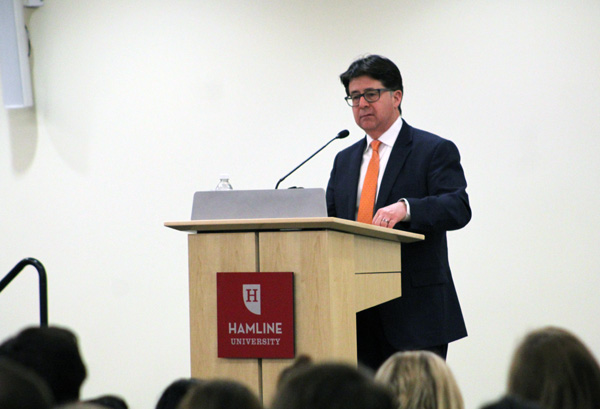Unmaking a murderer
Acting attorney Dean Strang was on campus last Wednesday to talk about the effects of impoverishment on the criminal justice system, and what we can do to help.

Attorney Dean Strang speaks at Hamline University.
February 22, 2017
Poverty and the criminal justice system have been irrevocably linked as of late, with the issue coming to a head on last Wednesday’s discussion which found a packed room of both students and members of Hamline’s community engaged in a discussion about poverty led by Wisconsin attorney Dean Strang, one of the defending attorneys who worked on Steven Avery’s case during the documentary series “Making a Murderer.”
“My charge tonight was to speak for a bit on some broader considerations that Steven Avery’s case and the film about [his family] posed to thoughtful viewers…Principally what I want to suggest to you is that [a] film like “Making a Murderer” invites us to re-think how we define and perceive poverty,” Dean Strang said.
Using Avery’s case as an example of this topic, he soon launched into a discussion about what he believes we need to do to change some of our viewpoints about the issue.
According to Strang, we as a viewing populace tend to think too narrowly about poverty. While many of us mainly define poverty as strictly a financial matter tied to one’s own security, Dean Strang suggests that “the financial is just one plane or vector that we must think about poverty.”
Having worked for three decades in the criminal justice system, Strang is all too familiar with the financial side of poverty. But what has struck him the most about the poverty he has seen has nothing to do with the financial.
“We are surrounded in the courts by poverty all of the time—much of it financial, yes—but I see regularly a poverty of education among the defendants, the victims and the citizen witnesses drawn into the criminal justice system. I see an impoverishment of mental health, an impoverishment of language skills, an impoverishment [of] cultural competency…but probably more than anything I see an impoverishment of hope. An impoverished sense that life might not hold more than trips back to a courthouse,” Strang said.
Strang went on to extrapolate a bit about his last comment, citing the fact that since many of the witnesses to crimes come from the same impoverished backgrounds as the perpetrators themselves, he often finds that those exposed to such acts will often find themselves back in the courthouse again later on; this time playing a different role than just a witness. To put it simply, Strang said that “Today’s victim of crime may become next year’s defendant within a case.”
Dean Strang used the example of Steven Avery’s family as an instance of the poverty that he was talking about. Despite owning a family business for over three generations, they still are a family that are barely eking out a living. He also used the example of one of the clients he was assigned to as a public defender, who did not know his own history and lacked the resources to discover it on his own.
But Strang did not just talk about how poverty has affected the criminal justice system; he also talked about what we can do to help improve it. The most basic thing that he believes we need to change: how we go about tackling the issue of poverty.
“We’ve spent a fair amount of time, at least since the 1960’s in this country trying to address financial poverty through collective action or government programs…When we look at government programs, you have to say candidly that our success has been mixed at best,” Strang said.
Rather than focusing solely upon the financial aspect of poverty, Strang suggests that we have to focus on eliminating the educational and mental and historical poverty found within our country. In that way, we could be successful.Another issue that Strang says we could improve upon is our perception of justice.
“When we talk about justice, we often think of the courthouse or the legal system…By the time we get to a courthouse, the injustice has already been done…nothing in court can redeem that,” Strang said.
In order to truly provide justice within our country, Strang says that we must focus upon eliminating more than just the financial issue of poverty.

